Projects
Projects at UW
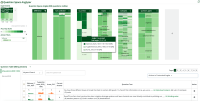
Visual Analytics for Exploratory Analysis in AI/ML System Development (Summer 2016-Present)
Artificial intelligence (AI) and machine learning (ML) is becoming pervasive in our life. There is an increasing need for developing such a system. Yet the development processes of ML models or complex AI systems are often not well-supported. Researchers and developers have to go through tedious processes of examining details to understand the current performance and look for actionable insights. In this project, I study how visual analytics and interactive visualization can help exploratory analysis in ML/AI development process for improving the systems.
Publications:
-
Nan-Chen Chen, Jina Suh, Johan Verwey, Gonzalo Ramos, Steven Drucker, and Patrice Simard. 2017. AnchorViz: Facilitating Classifier Error Discovery through Interactive Semantic Data Exploration. In Proceedings of the 23rd Intetnational Conference on Intelligent User Interface (IUI 2018).
 PDF
PDF
 slides
slides
-
Nan-Chen Chen, Been Kim. 2017. QSAnglyzer: Visual Analytics for Prismatic Analysis of Question Answering System Evaluations. In Proceedings of the IEEE Conference on Visual Analytics Science and Technology (VAST 2017).
 PDF
PDF
 slides
slides
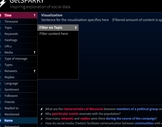
Visual Analytics for Social Scientists on Social Media Text Data (September 2014-Autumn 2016)
Social media websites provide rich environments for social scientists to study human behaviors and phenomena. However, given the enormity of many social media datasets, making data manageable for analysis by social scientists is still an unsolved problem. In this project, we focus on understanding the needs of social scientists, working to understand the contexts and research questions of their respective fields, and building visual analytics tools that facilitate their understanding of large text datasets.
Publications:
-
Nan-Chen Chen, Michael Brooks, Rafal Kocielnik, Sungsoo (Ray) Hong, Jeff
Smith, Sanny Lin, Zening Qu, and Cecilia Aragon. 2017. SparQs: Visual Analytics for Sparking Creativity in Social Media Exploration. In Proceedings of the 19th International Conference on Human-Computer Interaction (HCI International 2017).
 PDF
PDF
-
Margaret Drouhard, Nan-Chen Chen, Jina Suh, Rafal Kocielnik, Vanessa Pena-Araya, Keting Cen, Xiangyi Zheng, and Cecilia R. Aragon. 2017. Aeonium: Visual Analytics to Support Collaborative Qualitative Coding. In Proceedings of the 10th IEEE Pacific Visualization Symposium (PacificVIS 2017).
 PDF
PDF
-
Nan-Chen Chen, Michael Brooks, Rafal Kocielnik, Ray Hong, Zening Qu, Jeff Smith, Sanny Lin, Cecilia Aragon. 2017. Lariat: A Visual Analytics Tool for Social Media Researchers to Explore Twitter Datasets. In Proceedings of the 50th Hawaii International Conference on System Sciences (HICSS 2017).
 PDF
PDF
-
Nan-Chen Chen, Rafal Kocielnik, Margaret Drouhard, Vanessa Peña-Araya, Jina Suh, Keting Cen, Xiangyi Zheng and Cecilia R. Aragon. 2016. Challenges of Applying Machine Learning to Qualitative Coding. Presented at the CHI 2016 workshop on Human Centred Machine Learning (HCML 2016).
 PDF
PDF

Usable Data Abstractions for Next-Generation Scientific Workflows (August 2014-Summer 2016)
Supercomputing has become a critical tool for many scientific fields such as climate science and physics. Nevertheless, there are few models that provide insight into how scientists think about their use of supercomputers and how it influences their workflow. In this project, we leverage ethnographic approaches to study the current practice of the use of high performance computing and to gain a deeper understanding of how to design usable data abstractions for next-generation scientific workflows.
Publications:
Emoticons and Languages in Informal Text Communication (2013-Present)
The use of informal text communication (e.g. chat, texting, microblogs) is on the rise worldwide, including in collaborative work settings that span cultural boundaries. Socio-emotional communication is a critical determining factor in the cohesiveness of international work teams. However, text communication of any kind has often been viewed as impoverished and lacking in socio-emotional cues. To challenge this stereotype and provide evidence that technology is being repurposed, we study the patterns of emoticon use in informal text communication datasets and develop measures to detect social behavior patterns of emoticon use in the datasets.
Publications:
-
Nan-Chen Chen, Laurie Beth Feldman, Judith F. Kroll, Cecilia R. Aragon. 2014. Emoticons and Linguistic Alignment: How Visual Analytics Can Elicit Storytelling. In Poster Session of the 2014 IEEE Conference on Visualization (VIS 2014). (Presentation only)
 PDF
PDF
-
Nan-Chen Chen, Cecilia R. Aragon, Laurie Beth Feldman, Judith F. Kroll. 2014. Affect Analysis in Large-Scale Online Text Communication Datasets. In Poster Session of the Workshop on Algorithms for Modern Massive Data Sets (MMDS 2014). (Presentation only)
 PDF
PDF
-
Nan-Chen Chen, Laurie Beth Feldman, Judith F. Kroll, Cecilia R. Aragon. 2014. Establishing common ground in informal text communication: Emoticon use in first and second languages. In Poster Session of the Conference on Finding Common Ground: Social, Ecological, and Cognitive Perspectives on Language Use. (Presentation only)
 PDF
PDF
-
Cecilia R. Aragon, Nan-Chen Chen, Judith F. Kroll, Laurie Beth Feldman. 2014. Emoticon and Text Production in First and Second Languages in Informal Text Communication. In Proceedings of the 7th International Social Computing, Behavioral Modeling and Prediction Conference (SBP 2014), Springer, 217-222.
 PDF
PDF
Past Projects

Low-cost Smartphone Solution for Sensing Nasal Symptoms (2012)
Nasal symptoms are not uncommon but annoying in our daily life, especially to people with hayfever. The real causes of a person's hayfever are often hard to determine, so as the treatment effect. In order to trace a person's nasal symptoms in daily life for helping diagnosis, our project Listen-to-Nose comes as an audio-based mobile application that detects nasal symptoms such as a runny nose, stuffy nose, and sneezing. To sense which symptoms the user has, the application recognizes sound patterns corresponding to blowing or sneezing.
Publication:
- Nan-Chen Chen, Kuo-Cheng Wang, and Hao-Hua Chu. 2012. Listen-to-nose: a low-cost system to record nasal symptoms in daily life. In Proceedings of the 14th ACM International Conference on Ubiquitous Computing (Pittsburgh, USA, September 5-8, 2012). UbiComp '12. ACM, New York, NY, USA, 590-591. DOI=http://doi.acm.org/10.1145/2370216.2370319

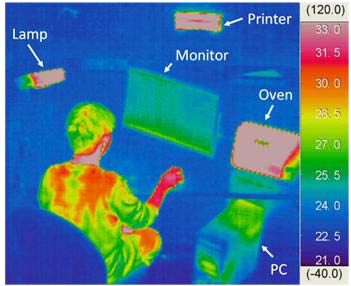
HeatProbe (2011)
HeatProbe is a thermal-based power meter system that tracks the energy consumed by individual appliances. HeatProbe disaggregates total power usage from a master power meter into individual appliance power usage by using a thermal camera and image processing techniques to detect the heat patterns generated by running appliances. Since appliances produce heat as a byproduct of their operation, HeatProbe determines changes in an appliance's power state by tracking its surface temperature. A rising surface temperature implies that the appliance has been turned on, while a falling surface temperature implies the appliance has been turned off.
Publications: - Chuang-Wen You, Hsin-Liu Kao, Bo-Jhang Ho, Nan-Chen Chen, Yi-Hsuan Hsieh, Polly Huang, Hao-Hua Chu. 2014. Thermalprobe: Exploring the use of thermal identification for per-user energy metering. In Proceedings of IEEE International Conference on Green Computing and Communications [Best Paper Award].
 PDF
PDF
- Bo-Jhang Ho, Hsin-Liu Cindy Kao, Nan-Chen Chen, Chuang-Wen You, Hao-Hua Chu, and Ming-Syan Chen. 2011. HeatProbe: a thermal-based power meter for accounting disaggregated electricity usage. In Proceedings of the 13th ACM International Conference on Ubiquitous Computing (Beijing, China, September 17-21, 2011). UbiComp '11. ACM, New York, NY, USA, 55-64. DOI=http://doi.acm.org/10.1145/2030112.2030121
 PDF
PDF
-
Nan-Chen Chen, Bo-Jhang Ho, Hsin-Liu Kao, Chuang-Wen You, Hao-Hua Chu, and Ming-Syan Chen. 2011. HeatProbe: a thermal-based power meter System for tracking per-user power consumption. In Poster Session of the 9th International Conference on Pervasive Computing (San Francisco, USA, June 12-15, 2011). Pervasive '11. (Presentation only)
 PDF
PDF
Past Non-Research Projects
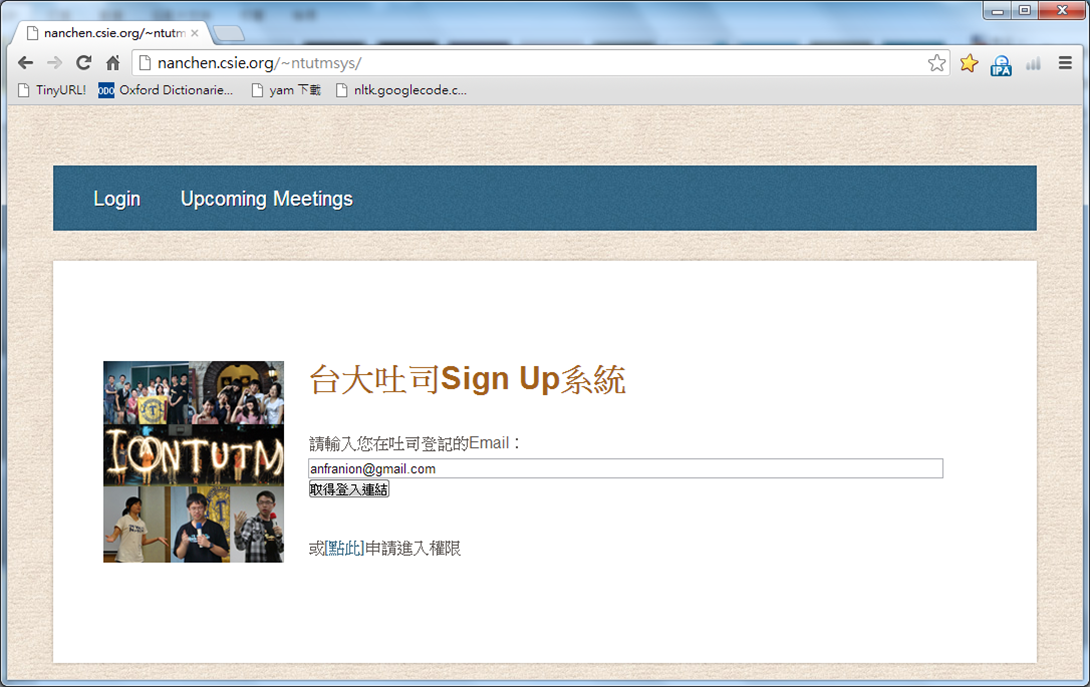
NTUTM Sign Up System (2012)
This is an online system (in Chinese) that I built in the summer of 2012 to help NTU Toastmasters Club (NTUTM) members to sign up for meeting positions. It will automatically record meeting positions that members take so members can check their status in the system. In addition, we have an RFID reader to allow members to sign in by easy cards.
- Link: http://nanro.org/~ntutmsys
- Slides for Introduction:

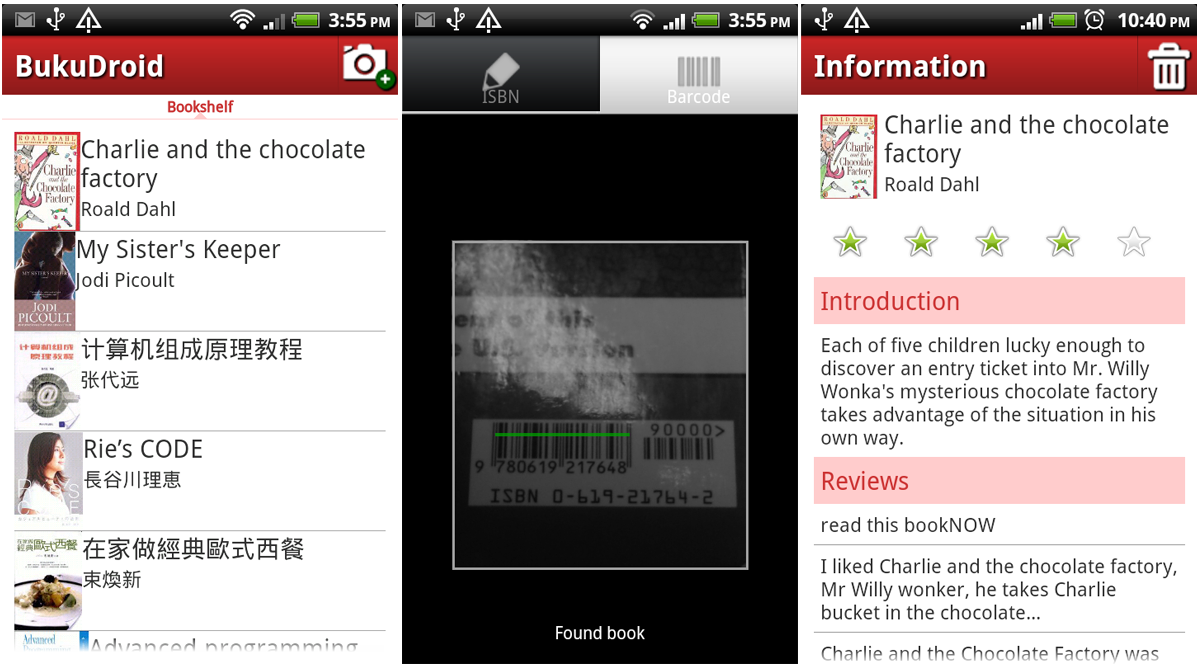
BukuDroid (2011)
An Android App that can help users find book comments by scanning barcodes. This is the course final project of Mobile Phone Programming (NM5216)

Pet Pet (2010)
A little pet breed game. The main goal is to practice Design Patterns, for it is the final project of Design Patterns and Software Development (CIE7148).
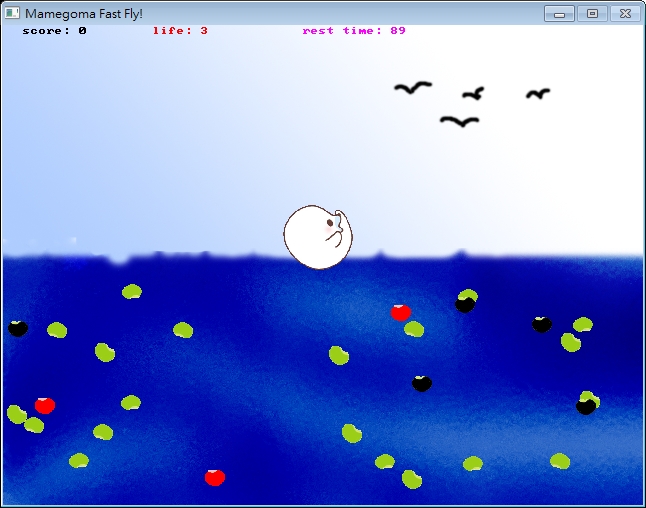
Mame Fast Fly (2008)
Beans! Eat as much as you can! Be aware of the bad beans! Get good beans!
This is a little game for fun. It is also the final project of Introduction to Computer Programming (CSIE1210), and it is implemented with Allegro.
This is a little game for fun. It is also the final project of Introduction to Computer Programming (CSIE1210), and it is implemented with Allegro.
